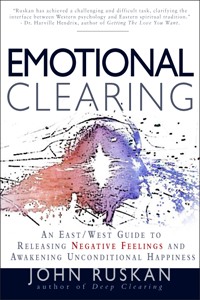John Ruskan's Emotional
Clearing
............ |

the book
»EmClear
testimonials
»Amazon
testimonials
»Amazon UK
testimonials
»table of contents
»reviews

|
     |
Emotional Clearing has been on the continuous
best-seller list of New Leaf Distributing, the world's largest New
Age book distributor for over three years! It has been on the best-seller
table at East/West Books, New York City's largest New Age bookstore
for seven years! It has placed number
one for several months on the bestseller list at Watkins Books, London
- the UK's largest New Age bookstore.
Emotional Clearing has been published in
North America 2001 by Broadway Books/Random House; and translated into
Spanish, Japanese, Chinese, Croatian, Portuguese (Brazil), Polish,
German, and is published in the UK/Australia by Rider.
Emotional
Clearing is a cutting-edge East/West system, originally conceived
as a means to work on yourself. The book contains the full system
including a comprehensive philosophical background, the steps of
the Emotional Clearing process, detailed instructions in
how to safely and effectively engage and release feelings, breathwork,
practical suggestions for setting up your personal practice, and
case studies. |
From John-
I wrote this book because it was
what I was searching for but couldn't find anywhere.
What emotion
do you struggle with? And what is the feeling
behind that emotion?
For example, you may experience the emotion of anxiety,
anger, frustration, heartbreak, sadness, creative blocking or
depression at certain times, but
do you know that there's a specific feeling hidden behind that emotion
such as fear, loss of self-determination,
sexual frustration, lack of nurturing, lack of significance, inadequacy,
loneliness, to name a few?
Until you see the feeling behind the emotion and take
steps to release both, you will continue to be plagued by circumstances
that the negativity you are holding within attracts to you.
 Many people have emailed me, telling me that
this is the book they have desperately needed. They sincerely appreciate
what is being presented here and are strongly
impacted because they have experienced being without
guidance as they go deeper into the psychological dynamics of inner consciousness
work. They have just enough experience and knowledge to understand and
value the subtlety of the Emotional Clearing Process. Many people have emailed me, telling me that
this is the book they have desperately needed. They sincerely appreciate
what is being presented here and are strongly
impacted because they have experienced being without
guidance as they go deeper into the psychological dynamics of inner consciousness
work. They have just enough experience and knowledge to understand and
value the subtlety of the Emotional Clearing Process.
This book is written for those people, and
even dedicated to "spiritual seekers everywhere."
If you have not been on the path, there is
no reason why you cannot begin your journey inward and upward here. If
you feel drawn to this work, to the right-brain emphasis on feelings and
the logic of the philosophy, you will succeed with it. You will develop
inner skills by practicing the process.
Emotional Clearing was
first published in 1993, and was the book that launched the current
"Emotional" genre, as well as coining the now widely-used phrase Emotional
Clearing, preceding the score of other books and energetic techniques
that have been influenced by it but have not surpassed its timeless
content.
How EMOTIONAL CLEARING will empower you:
Learn a super-effective 5-step non-religious spiritual
self-therapy inner process
that engages and balances all 5 levels of your cosmic being to release negative emotions and feelings and promote the true serenity
of transcendental consciousness.
Learn how irrational
fear is the number
one feeling behind money worry,
all types of anxiety
and insecurity and
how to release it. Learn how suppressed, unreleased fear can self-perpetuate
and actually attract conditions of scarcity and lack.
Learn what it means to suppress
a feeling, and how suppressed negative feelings attract
negative experiences to you until they are cleared!
Learn about projection
- how most of your perceptions and experiences - especially the difficult
ones - are a reflection of your suppressed feelings.
Learn about emotional
duality, and how trying to apply positive
thinking to eliminate negative feelings can result
in more of the negative!
Learn how the wisdom
of the body can be a major aid in emotional release.
Learn a simple but effective exercise to shield
yourself from psychic negativity around you.
Learn how to contact and experience
the 3 major healing energies of the universe, within and without:
Yin, Yang, and Transcendental,
to put your inner healing on the fast track!
Deepen your awareness and vocabulary of your feelings
by learning about the emotional aspects of all ten
chakras - the energy centers of your body. Learn how
to experience these
centers as part of your releasing.
|
|
Emotional Clearing can be
used alone or with:
All Yogas
Pain Body
Meditation
TM
Buddhism
A Course in Miracles
Energy Psychology
EFT
New Age Spirituality
12-Step
Hypnotherapy
Psychotherapy
Bodywork
Reiki
Breathwork
|
|
| |
Spiritual Self-Therapy
Emotional Clearing focuses on the vital
but often misunderstood issue of emotional healing and growth on the path
to higher consciousness. It presents a revolutionary synthesis of Eastern
and Western psychological principles, resulting in a profound system of
non-religious spiritual self-therapy
that can touch and transform all levels of your being.
This ground-breaking work fills a void in the current New Age/ alternative-healing/
self-help book field. While a great number of books address alternative
healing and pathways to spiritual fulfillment, there are almost no books
that show in depth how to work with feelings as we advance on our journey.
This area has been left to the Western psychological writers and psychotherapists
who, sadly, often are unable to genuinely link the approaches they advocate
to the holistic or spiritual path. Such an approach is especially needed
as we engage in any work on ourselves, whether psychological, spiritual,
or even physical, because one of the first aspects of our journey is that
feelings and emotions are released from their suppressed condition. If
we don't know how to handle these feelings, we become stuck and growth
will not occur.
I hope you have been able to sense that this book
is full of original insights into spiritual healing that you won't find
elsewhere that go way beyond typical New Age doctrine. For example, let's
explore in more detail the idea of loving
yourself, which is commonly talked about in
New Age circles. Usually, it's assumed that this is a self-evident concept;
you just start trying to "love yourself" as you would any other
thing or person. But here's what I say about it in Emotional Clearing:
When the expressions "loving yourself"
or "self-love" are first heard, there may be confusion about what
is meant. This is because we think in terms of the love we are familiar
with, dependent love. If we try to love ourselves, we may take an
approach similar to that used in dependent love, using ourselves
as the object of our love. We may try to escape into ourselves,
as we escaped into others. We may become self-absorbed and self-indulgent,
putting our own needs first. The motive is still to escape. We reject
unhappiness and, in so doing, reject ourselves.
Self-love has nothing to do with using yourself as the object of your love. Self-love means that your love comes from within, is generated from within, not from "loving" any object because it may please you tremendously, whether that object is someone else or yourself. Self-love is a condition of awareness, a way of perceiving, an attitude, which results in an integrated perception of the world.
The art of loving yourself begins with self-acceptance. They are essentially the same. You begin loving yourself when you stop rejecting yourself, especially on the feeling level. When you practice self-acceptance of your feelings as they are now, you will experience real changes in consciousness. You no longer try to juggle people or possessions in the external world in order to find fulfillment. You find fulfillment from within, simply by accepting, without acting out, your feelings as they are right now.
Do not underestimate the importance of self-acceptance. It can end the emotional pain that you feel or lead to the spiritual experience you want. Starting with the mundane, you will reach the highest of inner realization. In welcoming all your feelings, you become whole; life becomes holistic. You experience oneness. You no longer compulsively search for oneness in the external world, whether with another person or with an achievement. You accept and love yourself.
|
|
| |
Or, let's look at another commonly recommended quality, FORGIVENESS:
Forgiveness is the realization
that blame is a mistake
Forgiveness is, of course, a very desirable quality, but often we misunderstand what it means. Forgiveness means finally seeing that the other person was not really responsible for what we thought came from them. Sometimes we try to force ourselves to forgive, thinking we are being spiritual or loving, or simply in the attempt to avoid pain. We continue to believe that the other is responsible for what has happened to us, but now we have pardoned them for their behavior.
Such "forgiveness" is intellectual, pseudo, and self-deceptive. It puts us more out of touch with our inner experience. It can even inflate the ego, because we think we are generous enough to forgive. True forgiveness means understanding that the original blame was wrong; it is not the granting of a pardon for what we mistakenly believe someone has done to us.
Blame is particularly relevant in parent/child dynamics, which traditional therapy focuses on heavily. We are encouraged to forgive our parents, often without understanding that we should own our past. This kind of therapy may work in the long run, but the question is, would another, more realistic approach work more effectively? We choose our parents and early environment to serve as a catalyst for our character. The events of childhood merely activate contents latent in the child's subconscious, a viewpoint being discussed and supported by transpersonal psychologists today.
Often we don't want to let go of blame because of nothing more than pride. Unconsciously we understand the truth that we are responsible for our experience. The conscious ego, however, wants to blame because it is defending itself. It does not want to feel that it could be stupid enough to cause harm to itself. The nature of the ego, and of highly egocentric people in particular, is always to be right, and blame is usually how self-righteousness is maintained.
|
|
